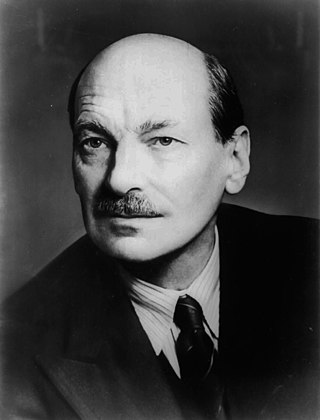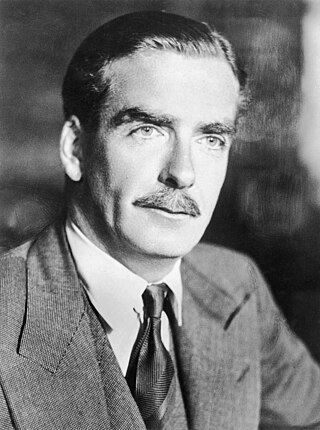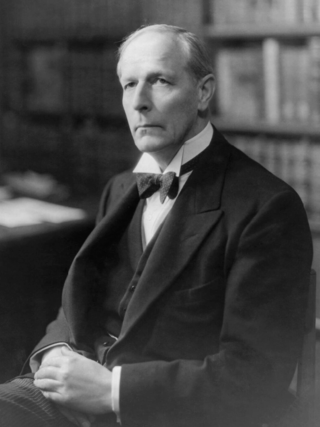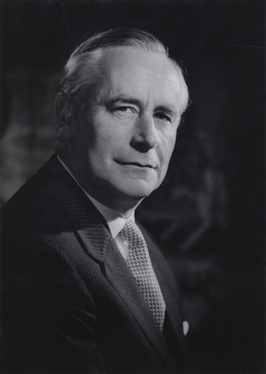
Clement Richard Attlee, 1st Earl Attlee, was a British statesman and Labour Party politician who served as Prime Minister of the United Kingdom from 1945 to 1951 and Leader of the Labour Party from 1935 to 1955. He was Deputy Prime Minister during the wartime coalition government under Winston Churchill, and served twice as Leader of the Opposition from 1935 to 1940 and from 1951 to 1955. Attlee remains the longest serving Labour leader and is widely considered by historians and members of the public through various polls to be one of the greatest Prime Ministers of the United Kingdom.

Aneurin "Nye" Bevan PC was a Welsh Labour Party politician, noted for tenure as Minister of Health in Clement Attlee's government in which he spearheaded the creation of the British National Health Service. He is also known for his wider contribution to the founding of the British welfare state. He was first elected as MP for Ebbw Vale in 1929, and used his Parliamentary platform to make a number of influential criticisms of Winston Churchill and his government during the Second World War. Before entering Parliament, Bevan was involved in miners' union politics and was a leading figure in the 1926 general strike. Bevan is widely regarded as one of the most influential left-wing politicians in British history.

Hugh Todd Naylor Gaitskell was a British politician who served as Leader of the Labour Party and Leader of the Opposition from 1955 until his death in 1963. An economics lecturer and wartime civil servant, he was elected to Parliament in 1945 and held office in Clement Attlee's governments, notably as Minister of Fuel and Power following the bitter winter of 1946–47, and eventually joining the Cabinet as Chancellor of the Exchequer. Facing the need to increase military spending in 1951, he imposed National Health Service charges on dentures and spectacles, prompting the leading left-winger Aneurin Bevan to resign from the Cabinet.

Earl Attlee is a title in the Peerage of the United Kingdom. It was created on 16 December 1955 for Clement Attlee, the former Labour prime minister. At the same time he was made Viscount Prestwood, of Walthamstow in the County of Essex, which serves as the subsidiary title to the earldom and is also in the Peerage of the United Kingdom.

The 1955 United Kingdom general election was held on Thursday 26 May 1955, four years after the previous general election in 1951. It was a snap election: after Winston Churchill retired in April 1955, Anthony Eden took over and immediately called the election in order to gain a mandate for his government. It resulted in a majority of 60 seats for the government under new leader and Prime Minister Anthony Eden; the result remains the largest party share of the vote at a post-war general election. This was the first general election to be held with Elizabeth II as monarch. She had succeeded her father George VI the year after the previous election.

Christopher Addison, 1st Viscount Addison,, was a British medical doctor and politician. A member of the Liberal and Labour parties, he served as Minister of Munitions during the First World War and was later Minister of Health under David Lloyd George and Leader of the House of Lords under Clement Attlee.

Albert Victor Alexander, 1st Earl Alexander of Hillsborough,, was a British Labour and Co-operative politician. He was three times First Lord of the Admiralty, including during the Second World War, and then Minister of Defence under Clement Attlee.

William Allen Jowitt, 1st Earl Jowitt, was a British Liberal Party, National Labour and then Labour Party politician and lawyer who served as Lord Chancellor under Clement Attlee from 1945 to 1951.

Frank Soskice, Baron Stow Hill, was a British lawyer and Labour Party politician.

William Francis Hare, 5th Earl of Listowel,, styled Viscount Ennismore between 1924 and 1931, was an Anglo-Irish peer and Labour politician. He was the last Secretary of State for India, as well as the last Governor-General of Ghana.

William Whiteley was the Labour Member of Parliament (MP) for Blaydon in County Durham.

Richard Phipps Hornby was a British Conservative politician and businessman. He was Member of Parliament for Tonbridge for over 17½ years, from June 1956 to February 1974, holding a junior ministerial position for a year in the mid-1960s. He worked for the J. Walter Thompson advertising agency before, during, and after his career in Parliament, and was Chairman of the Halifax Building Society from 1983 to 1990.
John Dugdale was a British newspaper journalist and politician. Well-connected with the Labour Party establishment, he worked as Private Secretary to Clement Attlee and was appointed a Minister in his post-war government.
The 1955 Labour Party leadership election was held following the resignation of Clement Attlee. Attlee was Prime Minister from 1945 to 1951 and stayed on as party leader until he lost the 1955 general election.

Arthur Moyle, Baron Moyle, CBE was a British bricklayer, trade union official and politician. As a member of parliament for nineteen years, he was principally known for serving as Parliamentary Private Secretary to Clement Attlee during Attlee's Premiership. He was also perennially lucky in the ballot for Private Member's Bills.

Herbert Stanley Morrison, Baron Morrison of Lambeth, was a British politician who held a variety of senior positions in the Cabinet as a member of the Labour Party. During the inter-war period, he was Minister of Transport during the Second MacDonald ministry, then after losing his parliamentary seat in the 1931 general election, he became Leader of the London County Council in the 1930s. After returning to the Commons, he was defeated by Clement Attlee in the 1935 Labour Party leadership election but later acted as Home Secretary in the wartime coalition.
Sir David Bruce Pitblado KCB CVO was a principal private secretary to the office of the Prime Minister of the United Kingdom. Serving from 1951 to 1956, he was associated with Prime Ministers Clement Attlee, Winston Churchill, and Anthony Eden. With his colleague Jock Colville, he was one of Churchill's last two principal private secretaries at 10 Downing Street.

When Britain emerged victorious from the Second World War, the Labour Party under Clement Attlee came to power and created a comprehensive welfare state, with the establishment of the National Health Service giving free healthcare to all British citizens, and other reforms to benefits. The Bank of England, railways, heavy industry, and coal mining were all nationalised. The most controversial issue was nationalisation of steel, which was profitable unlike the others. Economic recovery was slow, housing was in short supply, bread was rationed along with many necessities in short supply. It was an "age of austerity". American loans and Marshall Plan grants kept the economy afloat. India, Pakistan, Burma and Ceylon gained independence. Britain was a strong anti-Soviet factor in the Cold War and helped found NATO in 1949. Many historians describe this era as the "post-war consensus" emphasising how both the Labour and Conservative parties until the 1970s tolerated or encouraged nationalisation, strong trade unions, heavy regulation, high taxes, and a generous welfare state.

The statue of Clement Attlee on the Mile End campus of Queen Mary University of London is a bronze sculpture of the British Prime Minister, created by Frank Forster in 1988. The statue was commissioned by the Greater London Council and was intended to stand in Mile End Park. By the time of its completion in 1988, the GLC had been abolished and the statue was offered to any successor authority willing to pay the relocation costs. These were met by Tower Hamlets London Borough Council and the statue was erected outside the Limehouse Public Library to commemorate Attlee's role as the member for the Limehouse parliamentary constituency. The opening ceremony was carried out by Harold Wilson, the last living member of Attlee's 1945-51 administration. By the 21st century, the statue had been badly vandalised and was boarded up. In 2010, Tower Hamlets Council offered the statue to Queen Mary University of London on permanent loan. It was re-erected on a site at the Mile End Road campus, next to the People's Palace where Attlee had attended the vote counting in the 1945 general election and learnt of the victory which brought in his peace-time government.

Sir Denis Hubert Fletcher Rickett,, was a British civil servant who served as Clement Attlee's Principal Private Secretary (PPS) from 1950 to 1951 and as vice-president of the World Bank from 1968 until 1974.



















